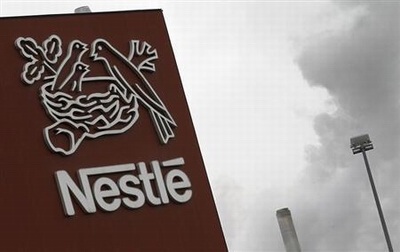
The maker of KitKat bars and Maggi soups, with almost $100 billion in sales last year, has reported disappointing revenue growth for the last three quarters, leaving its share price trailing those of its rivals, and investors questioning how the company can reverse the trend.
To improve its profitability in the face of volatile commodity prices, and falling sales of ice cream and water during a cool spring in Europe, Nestle may consider scaling back some parts of its business, said a buy-side analyst who did not want to be named.
"They will likely take more radical measures on their assets, not necessarily to sell entire businesses but they could stop developing certain activities in some markets," she said, citing ice cream in the United States as a relatively unprofitable area.
She said Nestle, which earmarks cost savings of about 1.5 billion Swiss francs ($1.61 billion) each year, could speed up cost savings in the Americas, which contributes around 45 percent of sales.
"The company saves in good and bad years, that continues. It's not only the supply chain, but also logistics, distribution. They are always saving and this is accelerating."
Investors expect to see Nestle post a flat to slightly lower first-half operating margin, versus 14.8 percent a year ago.
Important raw materials, such as raw sugar and arabica coffee, are at multi-year lows, but Nestle will have hedged them several months forward at higher levels than current spot prices, Kepler Cheuvreux analyst Jon Cox said.
One of its chief rivals in Europe, Anglo-Dutch consumer goods group Unilever (ULVR.L) (UNc.AS), improved its operating margin to 14 percent in the second quarter, while yoghurt maker Danone's (DANO.PA) margin fell to 13.3 percent.
Both saw quarterly underlying sales growth - 6.5 percent for Danone and 5 percent for Unilever - that Nestle is likely to undershoot with 4.6 percent in the first half, implying a pickup to 4.8 percent in the second quarter from 4.3 percent in the first, but still well below the company's own target of 5-6 percent annual sales growth.
Recent Danone results pointed to a recovery in Europe, while Unilever, whose sales growth was driven by home care and personal care products Nestle does not have in its portfolio, warned of a slowdown in emerging markets.
With 45 percent of sales in emerging markets at the end of March, Nestle is more exposed to that part of the world than Danone and Unilever with about 41 percent.
Nestle shares, up just 8.5 percent so far this year, are currently trading at 17.7 times forward earnings, below Danone and Kraft Foods (KRFT.O) at 18.5, Unilever at 18.8 times and Mondelez (MDLZ.O) at 19.5 times.
Peter Stenz, a fund manager at Swisscanto, said he would buy the stock, which currently trades at 65.30 francs, if it fell below 60 francs. "Nestle still generates a lot of cash. There will also be a share buyback at some point."
Because It's Worth It
Another factor weighing on Nestle's share price is uncertainty surrounding its 29.5 percent stake in cosmetics firm L'Oreal (OREP.PA), currently worth over $30 billion.
The expiry in April 2014 of an agreement with the Bettencourt family, L'Oreal's other big shareholder, to give each other first refusal will make it easier for Nestle to sell.
Independent consumer goods expert James Amoroso said it would make sense for Nestle to sell the stake and return the money to shareholders to let them benefit from the near-tripling in the L'Oreal share price since the financial crisis.
Vontobel analyst Jean-Philippe Bertschy, said Nestle might instead keep its holding as it waits for a suitable big takeover target to emerge. Last year, Nestle took over Pfizer's (PFE.N) baby food unit for $11.85 billion.
The buy-side analyst said a focus on more profitable businesses like pet food and infant formula, where sales grow faster than the average for the group, would help Nestle weather the tough trading environment.
Its Nespresso portioned coffee, which has seen sales growth slow from over 20 percent rates recently due to rising competition, has the potential to grow outside Europe, where it generates about 80 percent of sales, the analyst said.
"The battle will be carried out over the quality of the product and their ability to protect their brand and I am very confident about that," she said.





